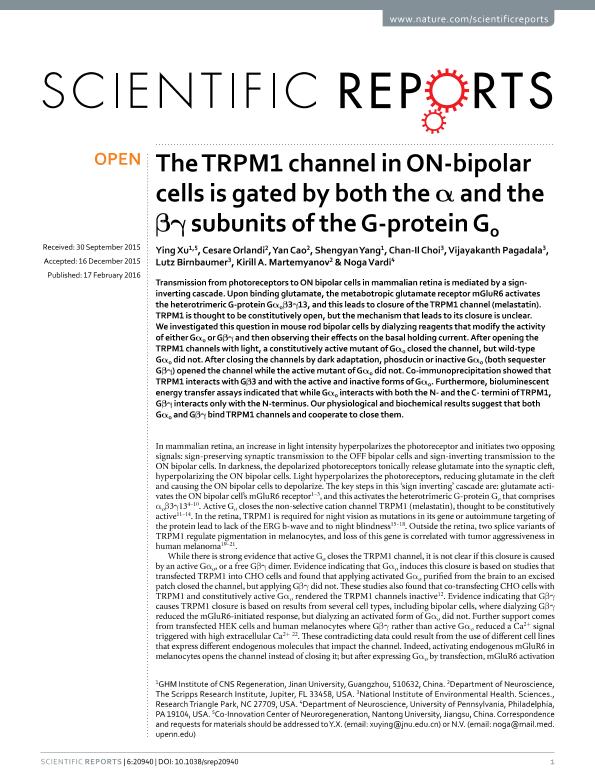Mostrar el registro sencillo del ítem
dc.contributor.author
Xu, Ying
dc.contributor.author
Orlandi, Cesare
dc.contributor.author
Cao, Yan
dc.contributor.author
Yang, Shengyan
dc.contributor.author
Choi, Chan-Il
dc.contributor.author
Pagadala, Vijayakanth
dc.contributor.author
Birnbaumer, Lutz

dc.contributor.author
Martemyanov, Kirill A.
dc.contributor.author
Vardi, Noga
dc.date.available
2018-06-19T19:17:20Z
dc.date.issued
2016-02
dc.identifier.citation
Xu, Ying; Orlandi, Cesare; Cao, Yan; Yang, Shengyan; Choi, Chan-Il; et al.; The TRPM1 channel in ON-bipolar cells is gated by both the α and the βî 3 subunits of the G-protein G o; Nature Publishing Group; Scientific Reports; 6; 2-2016; 1-13
dc.identifier.issn
2045-2322
dc.identifier.uri
http://hdl.handle.net/11336/49398
dc.description.abstract
Transmission from photoreceptors to ON bipolar cells in mammalian retina is mediated by a sign-inverting cascade. Upon binding glutamate, the metabotropic glutamate receptor mGluR6 activates the heterotrimeric G-protein Gα o β3γ 313, and this leads to closure of the TRPM1 channel (melastatin). TRPM1 is thought to be constitutively open, but the mechanism that leads to its closure is unclear. We investigated this question in mouse rod bipolar cells by dialyzing reagents that modify the activity of either Gα o or Gβγ 3 and then observing their effects on the basal holding current. After opening the TRPM1 channels with light, a constitutively active mutant of Gα o closed the channel, but wild-type Gα o did not. After closing the channels by dark adaptation, phosducin or inactive Gα o (both sequester Gβγ 3) opened the channel while the active mutant of Gα o did not. Co-immunoprecipitation showed that TRPM1 interacts with Gβ3 and with the active and inactive forms of Gα o. Furthermore, bioluminescent energy transfer assays indicated that while Gα o interacts with both the N-and the C-termini of TRPM1, Gβγ 3 interacts only with the N-terminus. Our physiological and biochemical results suggest that both Gα o and Gβγ 3 bind TRPM1 channels and cooperate to close them.
dc.format
application/pdf
dc.language.iso
eng
dc.publisher
Nature Publishing Group

dc.rights
info:eu-repo/semantics/openAccess
dc.rights.uri
https://creativecommons.org/licenses/by-nc-sa/2.5/ar/
dc.subject.classification
Otras Ciencias Biológicas

dc.subject.classification
Ciencias Biológicas

dc.subject.classification
CIENCIAS NATURALES Y EXACTAS

dc.title
The TRPM1 channel in ON-bipolar cells is gated by both the α and the βî 3 subunits of the G-protein G o
dc.type
info:eu-repo/semantics/article
dc.type
info:ar-repo/semantics/artículo
dc.type
info:eu-repo/semantics/publishedVersion
dc.date.updated
2018-06-19T16:52:53Z
dc.journal.volume
6
dc.journal.pagination
1-13
dc.journal.pais
Estados Unidos

dc.journal.ciudad
New York
dc.description.fil
Fil: Xu, Ying. Jinan University; China. Nantong University; China
dc.description.fil
Fil: Orlandi, Cesare. The Scripps Research Institute; Estados Unidos
dc.description.fil
Fil: Cao, Yan. The Scripps Research Institute; Estados Unidos
dc.description.fil
Fil: Yang, Shengyan. Jinan University; China
dc.description.fil
Fil: Choi, Chan-Il. Research Triangle Park; Estados Unidos
dc.description.fil
Fil: Pagadala, Vijayakanth. Research Triangle Park; Estados Unidos
dc.description.fil
Fil: Birnbaumer, Lutz. Research Triangle Park; Estados Unidos. Consejo Nacional de Investigaciones Científicas y Técnicas. Centro Científico Tecnológico Conicet - La Plata. Instituto de Investigaciones Biotecnológicas. Universidad Nacional de San Martín. Instituto de Investigaciones Biotecnológicas; Argentina
dc.description.fil
Fil: Martemyanov, Kirill A.. The Scripps Research Institute; Estados Unidos
dc.description.fil
Fil: Vardi, Noga. State University of Pennsylvania; Estados Unidos
dc.journal.title
Scientific Reports

dc.relation.alternativeid
info:eu-repo/semantics/altIdentifier/doi/https://dx.doi.org/10.1038/srep20940
dc.relation.alternativeid
info:eu-repo/semantics/altIdentifier/url/https://www.nature.com/articles/srep20940
Archivos asociados
